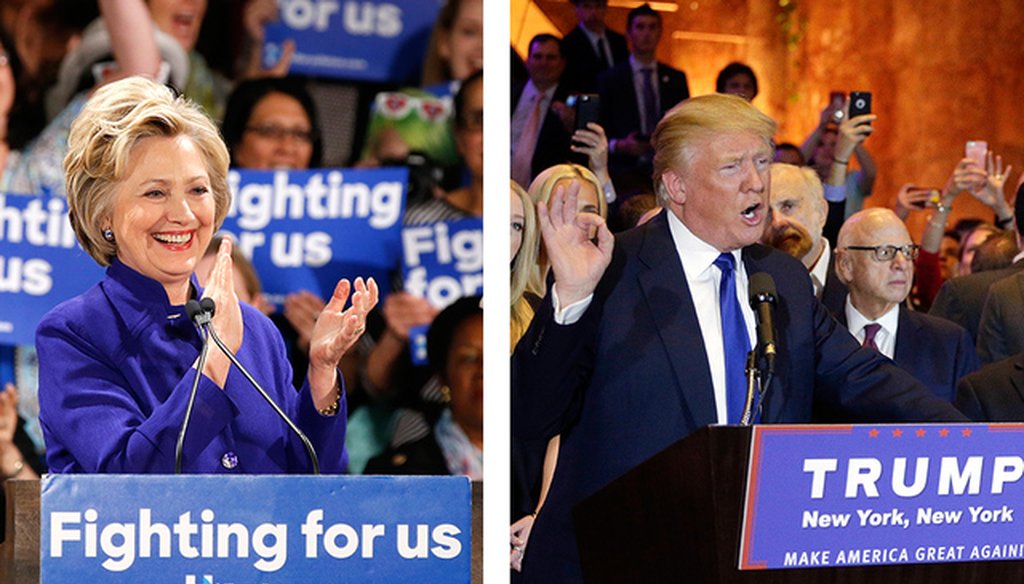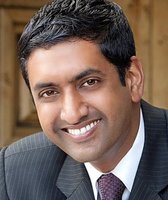Stand up for the facts!
Our only agenda is to publish the truth so you can be an informed participant in democracy.
We need your help.
I would like to contribute

Hillary Clinton and Donald Trump (Associated Press file photos)
Editor's note: PolitiFact editor Angie Holan wrote this op-ed column for our home newspaper, the Tampa Bay Times, explaining PolitiFact's approach to 2016 fact-checking.
One candidate is so calculated in how she parses facts, people see her at best as secretive and at worst as a liar.
The other candidate is so careless with facts, people see him at best as an entertainer and at worst as a liar.
This is 2016, and it’s gonna be messy.
I'm hearing a lot these days from longtime followers and newcomers to PolitiFact who have strong ideas about how the candidates should be covered.
Sign up for PolitiFact texts
One reader dismissed our fact-checking as just a form of opinion journalism. Another said we were ignoring false statements from Hillary Clinton. Still another asked how we could remain objective about a candidate who lies the way Donald Trump does.
These are two very different candidates, and the way they talk is a product of their unique backgrounds.
Take Trump. He’s had no elective experience whatsoever, yet he’s the Republican Party nominee. Ask historians if we’ve ever seen a presidential candidate like Trump, and they suggest Wendell Willkie. He’s the Republican lawyer and utilities executive who lost to Franklin Roosevelt in 1940.
Trump’s experience in New York real estate and on reality TV may account for his plain-spokenness and unpredictability, as well as his outlandish attacks on opponents. Literally, what will he say next?
On the other side is Clinton, an unprecedented candidate in her own right. She’s the first wife of a former president to seek the nation’s highest office. And she’s the first former first lady to serve as a senator or secretary of state. A surreal aspect of Clinton’s candidacy is that her husband was impeached in connection with sexual affairs at a time of unprecedented political rancor (rancor that has arguably been surpassed). Clinton has weathered investigation after investigation and perfected the art of the bulletproof answer.
From a fact-checking viewpoint, these candidates are polar opposites. Where Trump is an improviser, Clinton is hyper-prepared. Where Trump is loud, Clinton is measured. Where Trump has a proclivity for inaccuracy, Clinton has caution and precision. Readers notice that Trump gets a lot of negative ratings from PolitiFact, while Clinton doesn’t.
Does this show media bias? I don’t think so. Our work remains squarely focused on the facts. Let’s look at both sides.
Here are few wrong statements from Trump:
-
Trump said thousands of people in New Jersey cheered the fall of the World Trade Center on 9/11. But he has never produced proof, nor have any of the many inquiries found anything. We rated it Pants on Fire.
-
Trump continues to say he spoke out against the war in Iraq before it started. Again, there’s no evidence. We rated this repeated claim False.
-
He also says the United States is the highest taxed nation in the world. It’s not, by several objective measures. We rated his statement False.
Here are a few wrong statements from Clinton:
-
When Clinton said previous secretaries of state "did the same thing" by using private email, we rated that Mostly False. Former secretary Colin Powell used private email but not his own private server.
-
When she claimed in a debate that the terrorist group ISIS is "going to people showing videos of Donald Trump insulting Islam and Muslims in order to recruit more radical jihadists," we rated that False. There was no evidence to prove it.
-
When she said, "I'm the only candidate in the Democratic primary, or actually on either side, who Wall Street financiers and hedge fund managers are actually running ads against," we gave her statement our worst rating, Pants on Fire. People from Wall Street were heading super PACs that launched attacks on both Democrats and Republicans.
We reported on her recent comments about coal — "we're going to put a lot of coal miners and coal companies out of business" — and included the widely missing context in other media reports that Clinton also talked about creating new opportunities for current coal workers, possibly spurred by clean energy development. We also fact-checked her statement that market forces — specifically, cheap natural gas — were putting coal companies out of business. Her statement rated Mostly True.
I asked Larry Sabato, politics expert at the University of Virginia, what he thought about fact-checking Clinton, who has years of experience in public policy, and Trump, who doesn’t. Sabato said journalists need to stay the course.
"Think about the enormous powers of the presidency. There should be absolute equality in fact-checking," Sabato said. "Every word a president speaks matters. It has economic, social and diplomatic consequences. If any candidate is sloppy with facts or language, the voters need to weigh the consequences. It isn't just Trump. Clinton's recent gaffe about coal has cost her any chance of carrying coal counties in at least five states."
Joel Aberbach, a professor of political science at the University of California Los Angeles, said that no candidate should be given a pass on the facts, even when they don’t have conventional political experience: "If you're running for president (or any other office), it seems reasonable to expect that you have studied up on the issues"
We started PolitiFact in 2007 to bring readers the truth in politics. We focused our coverage squarely on what the politicians were saying and whether it was accurate. No more "he said, she said" journalism, and no more letting the candidates off the hook when we knew they were distorting. Our fact-checking of the 2008 presidential election won a Pulitzer Prize and the heartfelt thanks of many readers who praised us for simply telling it like it is.
Our reporting is not "opinion journalism," because our sole focus is on facts and evidence. We lay out the documents and sources we find; we name the people we interviewed. The weight of evidence allows us to draw conclusions on our Truth-O-Meter that give people a sense of relative accuracy. The ratings are True, Mostly True, Half True, Mostly False, False and Pants on Fire. Readers may not agree with every rating, but there should be no confusion as to why we rated the statement the way we did.
For voters interested in a simple question — "Is it true?" — PolitiFact is doing what we’ve always done. We fact-check, and you get to decide for yourself.
Our Sources
See fact-checks for sources.





















































